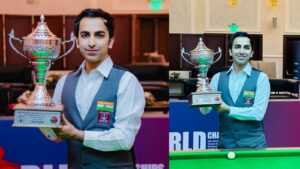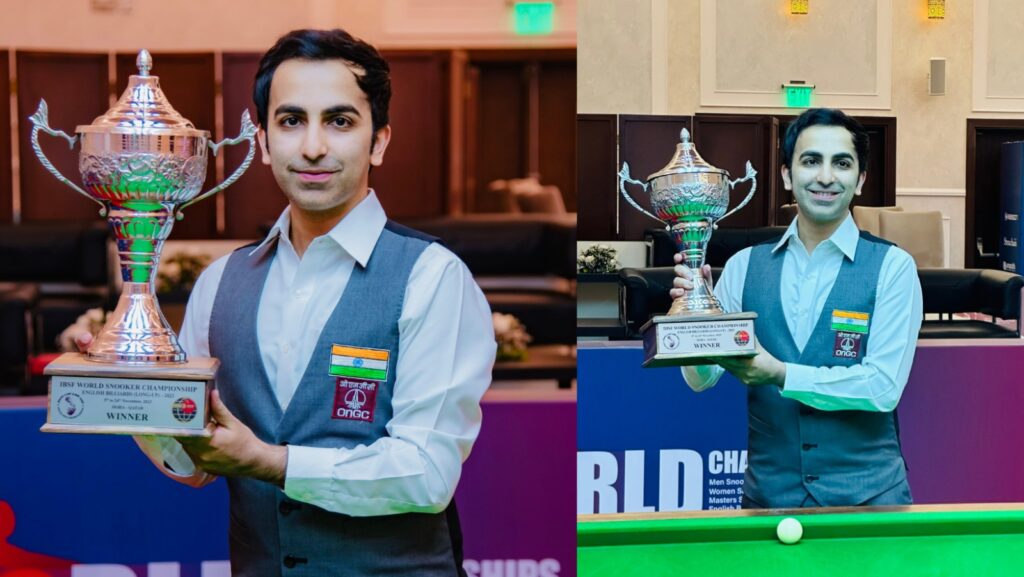
Pankaj Advani deserves a lot more time and attention from the Indian sporting system. Most nations, grieving the loss of their team in the final of a global competition, would have welcomed the news of one of their own winning an unprecedented 26th world title as a soothing balm, and with some fanfare. Not India, it seems.
India may take some more time to mature as a nation of sports lovers who are prepared and willing to shower all world champions with similar adulation. As many as 18 years after he won his maiden IBSF World Billiards Championships, Advani climbed the podium for the ninth time, winning the Long-up event in Doha earlier this week. But the reception at home has been rather muted.
Two decades after he claimed his first world title – the ISBF World Snooker Championships in Jiangmen, China – Advani has shown that he has retained the thrill of playing a good shot each time. By all accounts, freedom from anxiety has been the hallmark of his great adventure. It has allowed him to showcase his best on the highest stage more often than anyone else has. And in a sport where older players have won world crowns, the 38-year-old has quite a few more years left in competition.
The lull during the Covid-19 pandemic was a challenge but he marked his return to competition with title victories in the Asian Snooker Championships and the World Cup 6 Reds Snooker in 2021. These reassured him that his hunger and instinct for competition had not diminished in the time away from international events.
The World Championship has evolved from timed to points to Long-up formats and he has won them all, adapting to the challenges that each has presented. Advani continues to post new milestones, seemingly as motivated and hungry as he was 28 years ago when he persuaded Arvind Savur to coach him in the art and science of baize sport.
It is not his fault that his conquests have not been broadcast live and his sport has retained its amateur aura in an era when professionalism abounds. Four of his 17 World Championships came when the professionals and amateurs played under one banner. Surely, fans will recognise that Pankaj Advani has held his own against legends like Mike Russell and Peter Gilchrist.
I look up my notes and notice I had underlined his mental strength. “Everyone can play cannons and pot balls but only those who can control their minds make an impact at the highest level,” he told me as early 2005, when he became the first player to win the IBSF World Championships double – in the points and timed formats – in Malta.
“Of course, sometimes the mental effort leaves me drained but I guess I enjoy pressure while it lasts,” he had said, indicating how he relished challenges. “It makes me give off my best. It is easy to play well when leading but to be able to pick yourself up when trailing gives you something to write home about.”
His elder brother, Shree Advani, has played no small role in Pankaj’s career. Having been instrumental in getting his younger sibling interested in cue sport all those years ago, Shree has evolved as a sports psychologist, and it is easy to believe that the brothers would have had a few fascinating conversations about the mental aspect of sport.
The excitement in the voice of the legendary Geet Sethi when I called him up in 2005 to speak about Advani for an article in Outlook is fresh in my mind. “Pankaj is extra-special because he has performed at the highest level in both snooker and billiards and won three world titles before he even turned 20,” he told me, aware that he was not a mere pretender to the throne.
“I wonder how many others from any sporting discipline can boast of such an achievement. The best thing about Pankaj is that he possesses excellent demeanour on the table and away from it and has an exceptional mind. He can finish with many more world titles in the next two decades.”
The Ministry of Youth Affairs and Sports gave him the Arjuna Award for 2003 and the Rajiv Gandhi Khel Ratna for 2005. India also conferred the Padma Shri on him in 2008 and the Padma Bhushan 10 years later. But considering all that he done to fly the tricolour high in foreign lands, he deserves a lot more in the collective mindspace of India’s sporting ecosystem.
Indeed, Advani has already built a strong legacy, not just with the number of world titles but also as a thought-leader and someone who has played with a champion’s heart and has an endearing respect for the sport he loves so much. It is time for India, home to his 26 world titles in cue sport and much more that he has won, to celebrate him a lot more.




